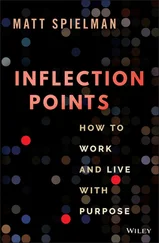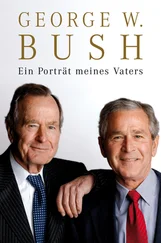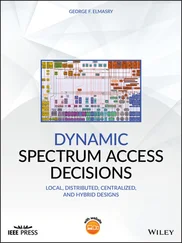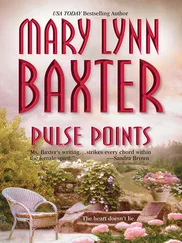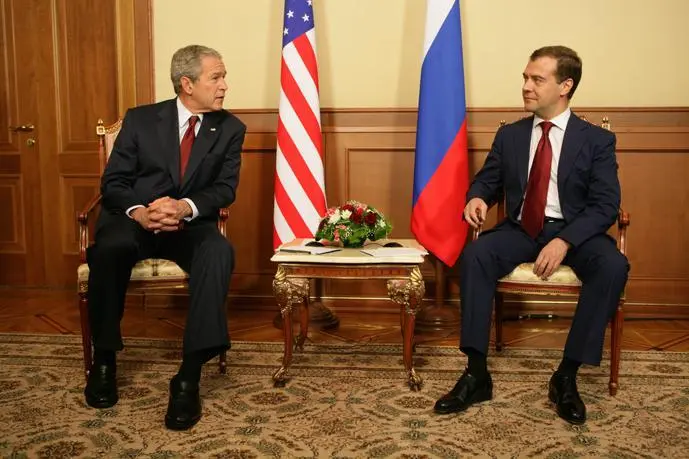
With Dmitry Medvedev. White House/Chris Greenburg
I called Medvedev when I got back to my hotel in Beijing. He was hot. So was I. “My strong advice is to start deescalating this thing now,” I said. “The disproportionality of your actions is going to turn the world against you. We’re going to be with them.”
Medvedev told me Saakashvili was like Saddam Hussein. He claimed Saakashvili had launched an unprovoked “barbarian” attack that had killed more than fifteen hundred civilians.
“I hope you’re not saying you’re going to kill fifteen hundred people in response,” I shot back. “You’ve made your point loud and clear,” I said. “I hope you consider what I’ve asked very seriously.”
My biggest concern was that the Russians would storm all the way to Tbilisi and overthrow the democratically elected Saakashvili. It was clear the Russians couldn’t stand a democratic Georgia with a pro-Western president. I wondered if they would have been as aggressive if NATO had approved Georgia’s MAP application.
I called Saakashvili next. He was understandably shaken. He described the Russian assault and urged me not to abandon Georgia. “I hear you,” I said. “We do not want Georgia to collapse.” In the coming days, I spoke out in defense of Georgia’s territorial integrity, worked with President Sarkozy—who was serving as president of the European Union—to rally nations to call on Russia to withdraw, dispatched relief supplies to Georgia aboard U.S. military aircraft, and promised to help rebuild the Georgian military.
At the Opening Ceremony of the Olympics, Laura and I were seated in the same row as Vladimir and his interpreter. This was the chance to have the conversation I had put off in the Great Hall. Laura and the man next to her, the king of Cambodia, shifted down a few seats. Putin slid in next to me.
I knew the TV cameras would be on us, so I tried not to get overly animated. I told him he’d made a serious mistake and that Russia would isolate itself if it didn’t get out of Georgia. He said Saakashvili was a war criminal—the same term Medvedev had used—who had provoked Russia.
“I’ve been warning you Saakashvili is hot-blooded,” I told Putin.
“I’m hot-blooded, too,” Putin retorted.
I stared back at him. “No, Vladimir,” I said. “You’re cold-blooded.”

After a few weeks of intense diplomacy, Russia had withdrawn most of its invading troops, but they maintained an unlawful military presence in South Ossetia and Abkhazia. Vladimir Putin called me during my last week in office to wish me well, which was a thoughtful gesture. Still, given what I’d hoped Putin and I could accomplish in moving past the Cold War, Russia stands out as a disappointment in the freedom agenda.
Russia was not the only one. I was hopeful that Egypt would be a leader for freedom and reform in the Arab world, just as it had been a leader for peace under Anwar Sadat a generation before. Unfortunately, after a promising presidential election in 2005 that included opposition candidates, the government cracked down during the legislative elections later that year, jailing dissidents and bloggers who advocated a democratic alternative.
Venezuela also slid back from democracy. President Hugo Chavez polluted the airwaves with hard-core anti-American sermons while spreading a version of phony populism that he termed the Bolivarian Revolution. Sadly, he squandered the Venezuelan people’s money and is ruining their country. He is becoming the Robert Mugabe of South America. Regrettably, the leaders of Nicaragua, Bolivia, and Ecuador have followed his example.
There are other isolated outposts of tyranny—places like Belarus, Burma, Cuba, and Sudan. My hope is that America will continue to stand with the dissidents and freedom advocates there. I met with more than a hundred dissidents over the course of my presidency. Their plight can look bleak, but it is not hopeless. As I said in my Second Inaugural Address, the freedom agenda demands “the concentrated work of generations.” Once change arrives, it often moves quickly, as the world saw in the European revolutions of 1989 and the rapid transformation of East Asia after World War II. When the people are finally set free, it is often the dissidents and the prisoners—people like Václav Havel and Nelson Mandela—who emerge as the leaders of their free countries.

Despite the setbacks for the freedom agenda, there were many more examples of hope and progress. Georgians and Ukrainians joined the ranks of free peoples, Kosovo became an independent nation, and NATO expanded from nineteen members to twenty-six. Under the courageous leadership of President Alvaro Uribe, Colombia’s democracy reclaimed its sovereign territory from narcoterrorists. With support from the United States, multiethnic democracies from India and Indonesia to Brazil and Chile became leaders in their regions and models for developing free societies around the world.
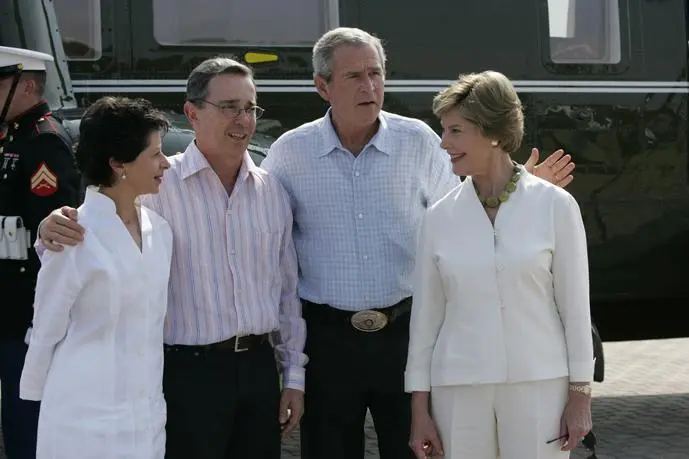
Alvaro Uribe and his wife, Lina Moreno, arrive at the ranch in Crawford. White House/Paul Morse
The most dramatic advances for freedom came in the Middle East. In 2001, the region saw terrorism on the rise, raging violence between Palestinians and Israelis, the destabilizing influence of Saddam Hussein, Libya developing weapons of mass destruction, tens of thousands of Syrian troops occupying Lebanon, Iran pressing ahead unopposed with a nuclear weapons program, widespread economic stagnation, and little progress toward political reform.
By 2009, nations across the Middle East were actively fighting terrorism instead of looking the other way. Iraq was a multi-religious, multiethnic democracy and an ally of the United States. Libya had renounced its weapons of mass destruction and resumed normal relations with the world. The Lebanese people had kicked out Syrian troops and restored democracy. The Palestinian people had an increasingly peaceful government on the West Bank and momentum toward a democratic state that would live side by side with Israel in peace. And Iran’s freedom movement was active after the summer 2009 presidential election.
Throughout the region, economic reform and political openness were beginning to advance. Kuwait held its first election in which women were allowed to vote and hold office. In 2009, women won several seats. Women also held government positions in Oman, Qatar, the United Arab Emirates, and Yemen. Bahrain named a Jewish female ambassador to the United States. Jordan, Morocco, and Bahrain held competitive parliamentary elections. While it remains a highly ordered monarchy, Saudi Arabia held its first municipal elections, and King Abdullah founded the kingdom’s first university open to both Saudi women and men. Across the region, trade and investment expanded. Internet use rose sharply. And conversations about democracy and reform grew louder—especially among women, who I am confident will lead the freedom movement throughout the Middle East.
In January 2008, I traveled to Abu Dhabi and Dubai, two Arab emirates that had embraced free trade and open societies. Their downtown centers boasted glittering skyscrapers filled with entrepreneurs and business professionals, men and women alike. In Dubai, I visited with university students studying in fields as diverse as business, science, and history.
Читать дальше









